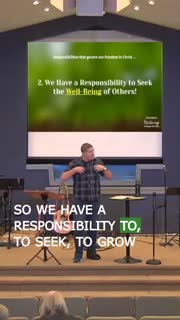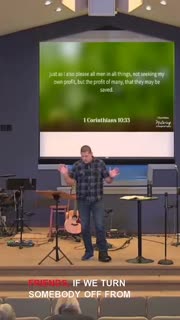Embracing Freedom: Responsibilities in Christ
Summary
### Summary
In today's continuation of our series on Paul's first letter to the Corinthians, we explored the profound theme of freedom in Christ and the responsibilities that accompany it. Paul addresses the Corinthian church's dilemma about eating meat sacrificed to idols, a topic that, while not directly relevant to us today, serves as a powerful metaphor for navigating modern issues that the Bible doesn't explicitly address. Using the analogy of a young person gaining the freedom to drive, we discussed how freedom comes with responsibilities. Similarly, our freedom in Christ is accompanied by responsibilities that guide our actions and decisions.
Paul emphasizes that while we are free from the law and our sins are forgiven, this freedom should not be an excuse for reckless living. Instead, we should lean into God's grace and embrace the responsibilities that come with our freedom. Paul outlines four key responsibilities: seeking spiritual growth, considering the well-being of others, glorifying God in all we do, and striving to win the lost.
First, we have a responsibility to grow spiritually. Paul uses the slogan "All things are lawful for me" to illustrate that while many actions may be permissible, not all are beneficial or edifying. We must evaluate our choices based on whether they contribute to our spiritual growth and the growth of others.
Second, we must seek the well-being of others. Paul advises that our actions should not only be beneficial to us but also considerate of how they affect others. This includes being mindful of weaker believers and avoiding actions that might cause them to stumble.
Third, we are called to glorify God in everything we do. Paul asserts that our ultimate aim should be to honor God, even if it means restricting our freedoms for the sake of others. Our actions should reflect God's glory and not bring shame to His name.
Finally, we have a responsibility to win the lost. Paul urges us to avoid giving offense to anyone, whether they are believers or non-believers, so that we do not hinder their path to salvation. Our lives should be a testament to Christ, drawing people towards Him rather than pushing them away.
In conclusion, while we enjoy great freedom in Christ, this freedom comes with significant responsibilities. By embracing these responsibilities, we can live lives that honor God, build up others, and draw people to Christ.
### Key Takeaways
1. Spiritual Growth is a Responsibility: Our freedom in Christ should lead us to make choices that foster spiritual growth. While many actions may be permissible, not all are beneficial or edifying. We must evaluate our decisions based on their impact on our spiritual development and that of others. [10:04]
2. Consider the Well-being of Others: Our actions should reflect a concern for the well-being of others. This means avoiding behaviors that might cause weaker believers to stumble or harm their spiritual growth. We are called to put others before ourselves, following the example of Christ. [18:58]
3. Glorify God in All We Do: Our ultimate aim should be to glorify God in every aspect of our lives. This involves making decisions that honor Him, even if it means restricting our freedoms. Our actions should bring glory to God and not bring shame to His name. [31:15]
4. Avoid Giving Offense to Win the Lost: We must be mindful of our words and actions to avoid offending others, especially non-believers. Our goal is to draw people to Christ, not push them away. By living lives that reflect Christ's love and gentleness, we can be effective witnesses for the gospel. [39:54]
5. Lean into Grace and Responsibility: Embrace the grace that God offers and the responsibilities that come with it. Lean into the responsibility to grow spiritually, consider others, glorify God, and seek to win the lost. By doing so, we fulfill our purpose as believers and honor the sacrifice of Christ. [48:52]
### YouTube Chapters
[0:00] - Welcome
[01:04] - Introduction to Freedom in Christ
[02:26] - Illustration of Driving Freedom
[03:39] - Responsibilities of Freedom
[05:14] - Understanding Salvation and Grace
[06:56] - Balancing Freedom and Responsibility
[08:27] - Spiritual Growth Responsibility
[10:04] - Evaluating Beneficial Actions
[13:05] - Illustration of Tomato Plant Growth
[14:25] - Making Lawful but Beneficial Choices
[18:58] - Responsibility to Others' Well-being
[23:20] - Navigating Meat Sacrificed to Idols
[29:44] - Objections to Restricting Freedom
[31:15] - Glorifying God in All Actions
[34:55] - Practical Ways to Glorify God
[39:54] - Avoiding Offense to Win the Lost
[43:42] - Mimicking Christ's Example
[48:52] - Leaning into Grace and Responsibility
[50:33] - Invitation to Embrace Grace and Responsibility
Study Guide
### Bible Reading
1 Corinthians 10:23-33 (ESV)
> "All things are lawful," but not all things are helpful. "All things are lawful," but not all things build up. Let no one seek his own good, but the good of his neighbor. Eat whatever is sold in the meat market without raising any question on the ground of conscience. For "the earth is the Lord's, and the fullness thereof." If one of the unbelievers invites you to dinner and you are disposed to go, eat whatever is set before you without raising any question on the ground of conscience. But if someone says to you, "This has been offered in sacrifice," then do not eat it, for the sake of the one who informed you, and for the sake of conscience—I do not mean your conscience, but his. For why should my liberty be determined by someone else's conscience? If I partake with thankfulness, why am I denounced because of that for which I give thanks? So, whether you eat or drink, or whatever you do, do all to the glory of God. Give no offense to Jews or to Greeks or to the church of God, just as I try to please everyone in everything I do, not seeking my own advantage, but that of many, that they may be saved."
### Observation Questions
1. What does Paul mean when he says, "All things are lawful," but not all things are helpful? ([08:27])
2. How does Paul suggest we should handle eating meat that has been sacrificed to idols when dining with others? ([21:53])
3. What is the ultimate aim Paul emphasizes for our actions, according to 1 Corinthians 10:31? ([31:15])
4. How does Paul instruct believers to avoid giving offense, and what is the purpose behind this instruction? ([39:54])
### Interpretation Questions
1. Why does Paul emphasize that not all lawful things are beneficial or edifying? How does this relate to our spiritual growth? ([10:04])
2. How does considering the well-being of others reflect Christ's example, and why is this important for believers? ([18:58])
3. In what ways can our actions either glorify God or bring shame to His name? How should this influence our daily decisions? ([33:04])
4. What does Paul mean by "give no offense" and how does this relate to our responsibility to win the lost? ([39:54])
### Application Questions
1. Reflect on a recent decision you made. Did you consider whether it was beneficial or edifying for your spiritual growth? How might you approach similar decisions differently in the future? ([10:04])
2. Think of a time when your actions might have caused a weaker believer to stumble. How can you be more mindful of others' well-being in your daily life? ([18:58])
3. Identify a specific area in your life where you can make a change to glorify God more fully. What practical steps will you take to implement this change? ([33:04])
4. Have you ever found yourself in a situation where your freedom in Christ conflicted with the conscience of another believer? How did you handle it, and what did you learn from the experience? ([23:20])
5. Consider your interactions on social media or in conversations. Are there ways you might be unintentionally offending others and hindering their path to Christ? How can you adjust your approach to be more gentle and loving? ([41:49])
6. How can you lean into both God's grace and the responsibilities that come with your freedom in Christ? Identify one specific responsibility you will focus on this week. ([48:52])
7. Reflect on the example of Jesus putting others before Himself. How can you imitate Christ in your relationships and daily interactions? ([26:34])
Devotional
Day 1: Spiritual Growth Through Discernment
Our freedom in Christ should lead us to make choices that foster spiritual growth. While many actions may be permissible, not all are beneficial or edifying. We must evaluate our decisions based on their impact on our spiritual development and that of others. Paul uses the slogan "All things are lawful for me" to illustrate that while many actions may be permissible, not all are beneficial or edifying. We must evaluate our choices based on whether they contribute to our spiritual growth and the growth of others. [10:04]
1 Corinthians 10:23-24 (ESV): "All things are lawful," but not all things are helpful. "All things are lawful," but not all things build up. Let no one seek his own good, but the good of his neighbor.
Reflection: Think about a recent decision you made. Did it contribute to your spiritual growth or hinder it? How can you make more discerning choices in the future?
Day 2: Prioritizing the Well-being of Others
Our actions should reflect a concern for the well-being of others. This means avoiding behaviors that might cause weaker believers to stumble or harm their spiritual growth. We are called to put others before ourselves, following the example of Christ. Paul advises that our actions should not only be beneficial to us but also considerate of how they affect others. This includes being mindful of weaker believers and avoiding actions that might cause them to stumble. [18:58]
Romans 14:13 (ESV): Therefore let us not pass judgment on one another any longer, but rather decide never to put a stumbling block or hindrance in the way of a brother.
Reflection: Identify someone in your life who might be affected by your actions. How can you adjust your behavior to support their spiritual well-being?
Day 3: Glorifying God in Every Aspect of Life
Our ultimate aim should be to glorify God in every aspect of our lives. This involves making decisions that honor Him, even if it means restricting our freedoms. Our actions should bring glory to God and not bring shame to His name. Paul asserts that our ultimate aim should be to honor God, even if it means restricting our freedoms for the sake of others. Our actions should reflect God's glory and not bring shame to His name. [31:15]
1 Corinthians 10:31 (ESV): So, whether you eat or drink, or whatever you do, do all to the glory of God.
Reflection: Consider an area of your life where you might not be glorifying God fully. What changes can you make to ensure that your actions in this area honor Him?
Day 4: Avoiding Offense to Win the Lost
We must be mindful of our words and actions to avoid offending others, especially non-believers. Our goal is to draw people to Christ, not push them away. By living lives that reflect Christ's love and gentleness, we can be effective witnesses for the gospel. Paul urges us to avoid giving offense to anyone, whether they are believers or non-believers, so that we do not hinder their path to salvation. Our lives should be a testament to Christ, drawing people towards Him rather than pushing them away. [39:54]
1 Corinthians 9:22 (ESV): To the weak I became weak, that I might win the weak. I have become all things to all people, that by all means I might save some.
Reflection: Think of a non-believer you interact with regularly. How can you adjust your behavior to be a more effective witness for Christ to them?
Day 5: Embracing Grace and Responsibility
Embrace the grace that God offers and the responsibilities that come with it. Lean into the responsibility to grow spiritually, consider others, glorify God, and seek to win the lost. By doing so, we fulfill our purpose as believers and honor the sacrifice of Christ. Paul emphasizes that while we are free from the law and our sins are forgiven, this freedom should not be an excuse for reckless living. Instead, we should lean into God's grace and embrace the responsibilities that come with our freedom. [48:52]
Titus 2:11-12 (ESV): For the grace of God has appeared, bringing salvation for all people, training us to renounce ungodliness and worldly passions, and to live self-controlled, upright, and godly lives in the present age.
Reflection: Reflect on the grace God has given you. How can you better embrace the responsibilities that come with this grace in your daily life?
Quotes
1. "Friends, the same is true also with our freedom in Christ, okay? In Christ, we have great freedom. We have been forgiven. If you've trusted Christ as your Savior, okay, and you are a believer, what that means is that you believe that Jesus's sacrifice on the cross, that God's offer of his son as a sacrifice for your sins applies to you. And what the scripture tells us then is that God has forgiven us and separated our sins as far as the east is from the west. So all of our sins are forgiven. All of our past, all of our present sins, all of our future sins are forgiven. So friends, there is a real freedom in Christ." [03:39] (50 seconds)
2. "So we should lean into that. Amen? We talk about walking by grace and leaning into God's grace. That's what that means. It means that not that now I've got to be perfect, but that when I sin, praise God for his grace. Praise God that that grace is already paid for it. Okay? So there is real freedom from sin. There's real freedom from the law in Christ. Now, I know what maybe some of you are thinking, well, pastor, there's freedom from the law, but there's still rules we have to follow, right? There are still, see, this is the thing, okay? Paul is very specific about it. He says, why then do you, if we are under grace, do we then come and put ourselves back under the law? He says, you're negating grace if you're putting yourself back under the law." [05:14] (51 seconds)
3. "Friends, first of all, we have a responsibility to seek to grow spiritually, okay? And we don't have a responsibility to go and sin any way we want to, okay? Paul starts out here in verse 23 with a phrase that I believe and many commentators believe had kind of become a slogan in Corinth, okay? They leaned into God's grace awful heavily, okay? And so Paul has said this before. He said it back in chapter six. And so this first phrase here, all things are lawful for me or all things are permissible for me. He says it here. He's already said it in chapter six. And so it's believed that this was kind of a slogan. That those who, for some of the Corinthians who took their freedom to say, we can do whatever we want to do, they leaned into this slogan. All things are permissible for me. All things are lawful for me, okay? And so Paul didn't want to say, Paul didn't want to disagree with him because technically that's true, okay? Technically it's true. However, there are some responsibilities that go along with that." [06:56] (71 seconds)
4. "So something may be, something may be legal. Something may be permissible for us to do, but it is not helpful or beneficial to us or others, then should we do it? No, okay? So the first part is, he says, all things are lawful, but all things are not helpful. The second part of verse 23, he says this, all things are lawful for me, but not all things edify. The word edify simply means build up. It's the Greek word okadomeo. It speaks originally of building a house, okay? So if you take that concept of building a house, and he's really talking about though our lives, he says, all things are not, not all things edify or not all things are helpful. So he says, not all things build up. He's not talking about a physical house. He's talking about our lives. We sing a song about that sometimes, about building our lives on Christ, okay? And so he's speaking metaphorically here of our spiritual growth." [08:27] (63 seconds)
5. "So we have a responsibility to, to seek, to grow spiritually ourselves and, and how our, how our actions affect that. And, and, but we also have a responsibility of how our actions affect other people. Look at verse 24. And as I said, verse 23, already, we've talked about this hints at that a little bit. Does it build others up? Does it, is it helpful for others? But in verse 24, he says this, let no one seek his own, but each one, excuse me, the other's wellbeing. So this reminds us of Philippians, right? Consider others better than yourself. Okay. So Paul, wants them to know, wants us to realize, listen, in the decisions we make, in the choices we make, don't just think about yourself. Isn't that kind of what our country or our world today, our society tells us to do? Our society very rarely tells us to think of others. Our society says, do what's best for you. Look out for number one, put you first. Okay. But scripture turns that on its head. And as Paul says, don't let no one seek his own, but each one, the other's wellbeing." [18:58] (73 seconds)
6. "So friends, we need to be careful, right? Are there things that come out of your mouth, offend others, and cause them? Because here's what I want you to notice, okay? There's a specific purpose Paul has in mind here. Look at verse 33. He says, just as I also please all men in all things, okay? Now, Paul's not saying here, telling us to be a people pleaser, okay? But here's what he is saying. He says, just as I please all men in all things, not seeking my own profit, the profit of many that they may be saved. So Paul's reason to not give offense is for what purpose? That they may be saved. That you won't offend somebody else and cut them off from ever listening to the gospel. Friends, are there things that come out of your mouth that offend somebody that they may never, ever, ever would listen to the gospel coming from you?" [39:54] (71 seconds)
7. "Friends, bringing glory to the Lord, bringing glory to God ought to be our number one ambition in all we do. Does this, this decision, this choice, this direction of what I'm doing, does it bring glory and honor to God or does it not? And listen, I know this morning I've kind of posited it like, either you bring glory to God or you bring shame to God. But guess what? There's also just kind of a neutral ground. And sometimes we think, well, as long as I'm neutral, it's okay. And listen, I know some decisions and things we do are neutral. Okay. But friends, as we grow in our walk with Christ, friends, bringing glory to God ought to be our main goal. That everything we do, listen, sometimes our decisions are not between bad and good, but they're between okay and what's best. And how can I bring glory to God? In a situation, you know, as we talk about these different responsibilities, this is the one that that is overarching over all the others. Okay. And that's kind of what Paul is saying here is if you can't do this, you can't listen, do it to bring glory to Jesus. Do it to bring glory to God. Whatever you will, it bring glory to the King of Kings and the Lord of Lords." [37:50] (82 seconds)
8. "Friends, if we turn somebody off from not just hearing us, but maybe from the gospel, I don't want to have nothing to do with them Jesus spouting people. Listen, for some of the stuff I read, if I wasn't a believer, I wouldn't want to either. The things that ought to come from us is kindness and gentleness and a demeanor of which is, yes, friends, when appropriate and when we get our opportunity to speak the truth in love. Don't ever not speak the truth in love. But we also need to show a kindness and a gentleness that, like Jesus, draws people and not pushes them away. Paul wants, with these verses, I believe, for our lives, for us, not to be about ourselves, not to be about our opinions, our agenda. Listen, some people are so, waiting for an opportunity to get their opinion out there, they just want to spout it. It doesn't matter what people think about it. Beware of that, friends. Paul's agenda is and says our agenda should be to please all men and not seek my own profit, but the profit of many that they may be saved." [41:49] (89 seconds)
9. "Friends, before you offend someone, before you let your judgmentalness come out, before you be judgmental, remember how God has been patient with you. Remember how good Jesus has been to you. Amen? Friends, yes, you are free to do what you want to do in many, many of those areas that the Bible doesn't speak specifically about. But if you're free to say what you want to say about those things, friends, but will it lead to spiritual growth? Will it be for the well-being of others? Will it bring glory to God and to the Lord Jesus Christ? And will it lead people to him?" [45:24] (47 seconds)
10. "Friends, we need to remember, nothing in our lives, number one, is as important as Jesus. Amen? And second, nothing in your life, friends, will be more important than what you do for him and the responsibility that you have as his child. Here's what I want to encourage you to do. First of all, I want you to lean into his grace. Hadn't talked about that since the beginning, have we? I want you to lean into his grace. Friends, God is such a grace-filled God. He's forgiven us through what is, he provided the sacrifice for our sins to be able to forgive us all of our sin. And we have freedom in Christ. Christ because of that. So lean into that. Don't not lean into that. Don't feel guilty for leaning into that. You know, every day when you mess up, guess what? You tell the devil, ha, Jesus died for me. Lean into it. That's what it means to lean into God's grace. But friends, not only do I want you to lean into God's grace, I also want you to lean into the responsibility Jesus has called us to. Lean into the responsibility to grow in him. Lean into the responsibility to put others before you. Lean into the responsibility to glorify him in everything you do. And lean into the responsibility to seek to win others to Christ. Friends, if we'll do that and do this, we'll be right where we need to be." [48:52] (99 seconds)










